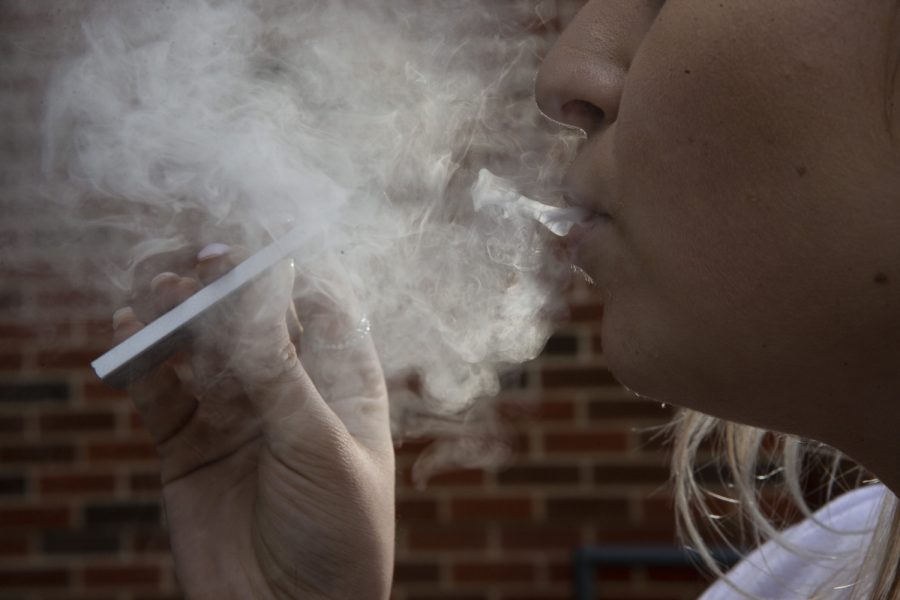FDA-authorized vape product is not safe for youth, Johnson County health officials say
The FDA approved marketing for three Vuse vaping products, stating the benefits to adult smokers quitting outweigh potential risks to youth this month.
Photo Illustration by Katie Goodale.
October 24, 2021
Some Iowa policymakers and public health experts worry that the FDA’s approval of sale and marketing of certain e-cigarettes could lead to a rise in youth nicotine use.
The FDA announced on Oct. 12 that it will approve the marketing for the Vuse Alto E-cigarette and two tobacco-flavored pods. In a press release, the FDA stated that it made this decision because young people generally begin with fruit flavored e-cigarettes rather than tobacco.
“These products are less appealing to youth and authorizing these products may be beneficial for adult combusted cigarette users,” the release stated.
Johnson County Public Health Educator Susan Vileta said that while the FDA approved marketing the Vuse products, it did not endorse the safety of the products.
The FDA said in the release that the listed vaping products are less toxic than combusted cigarettes based on current knowledge and comparisons between the products, but noted e-cigarettes still carry risks for non-smokers.
“Less toxic than what? A product that kills half of its customers?” Vileta said. “That’s what cigarettes do.”
Gabriel Conley, a student at the University of Iowa Carver College of Medicine, said the Vuse vaping products that were approved for marketing are seen as cessation products for adult cigarette smokers to quit.
“The idea is that these vaping products are going to be safer for adult smokers and better for public health in our country,” Conley said.
Vaping products have been a part of Iowa City and campus culture for a while. According to a 2019 National College Health Assessment Survey, 26.8 percent of UI undergraduates reported using e-cigarettes within the last 30 days of the time they took the survey. In another 2019 survey at a large Iowa City high school, 50 percent of students responded that they had vaped at least once before.
Sen. Joe Bolkcom, D-Iowa City, who has worked on legislation to curb vaping in Iowa, said he thinks the decision to market these products was a mistake. He added that young people could see the authorization and think the products are safe to use.
“I haven’t heard of very many people, if any, using tobacco cessation products as an entryway nicotine device, like with vapes,” Bolkcom said.
According to the Centers for Disease Control and Prevention, about 9.9 percent of Iowa’s high-school aged youth were smoking traditional cigarettes in 2019, compared with 19.9 percent that reported using any nicotine product.
Conley said the FDA only approved tobacco-flavored pods because young people mostly use fruity, candy-flavored pods and won’t want to try tobacco Vuse products. About 80 percent of e-cigarette users under 18 use flavored pods, according to anti-tobacco campaign the Truth Initiative.
Vileta said that, while young people are more likely to start vaping with flavored pods, like mint and bubblegum, the risk of young people getting addicted to vapes isn’t from the flavors. Rather, she said, it stems from their nicotine content, which has more than doubled from 2013 to 2018.
“That is a lot,” Vileta said.
According to a Truth Initiative Schroeder Institute and CDC study, the average nicotine content in e-cigarettes jumped from 2.10 percent in 2013 to 4.34 percent in 2018.
Bolkcom said that vaping among the younger generations was seen as an epidemic a few years ago and the number of young people vaping hasn’t decreased much since then.
The National College Health Assessment for Spring 2021 found that 21.9 percent of UI undergraduates vaped in the last three months.
Conley said over 2 million school-age children have vaped in the last year.
“Obviously, it is a concern, and the FDA is putting in some restrictions on what marketing the vapor company can actually do,” Conley said.
According to the release, the FDA is putting restrictions on digital, radio, and television marketing of the Vuse products to reduce the potential youth exposure to the products.
Conley said, if the authorization doesn’t work, for any reason, the FDA can suspend or withdraw the marketing approval at any time.
“When it comes down to, ‘Is this a good or a bad thing,’ obviously like many complicated issues — there are pros and cons to it,” Conley said.




















